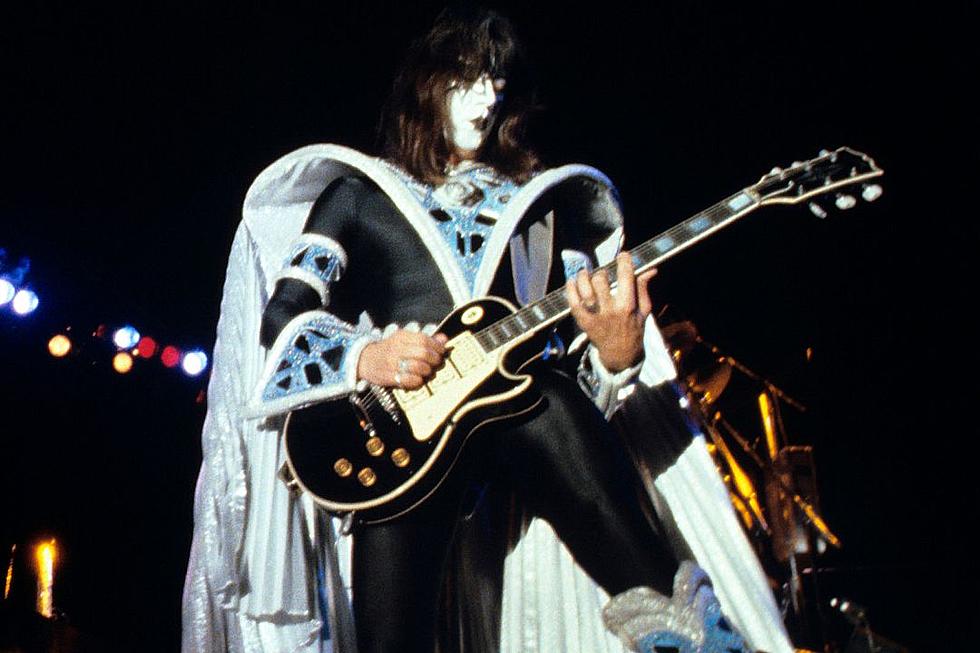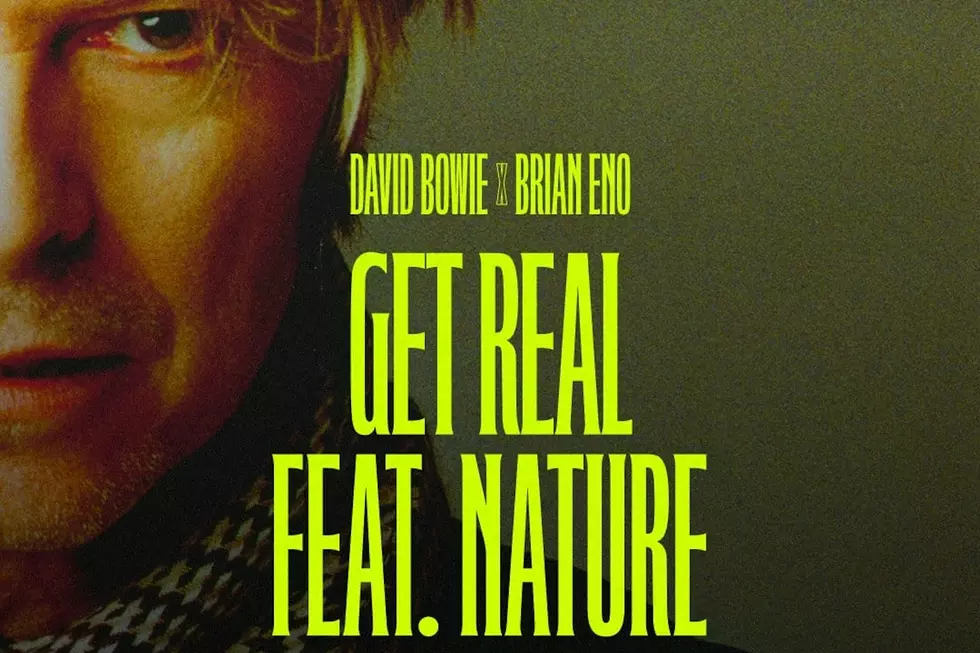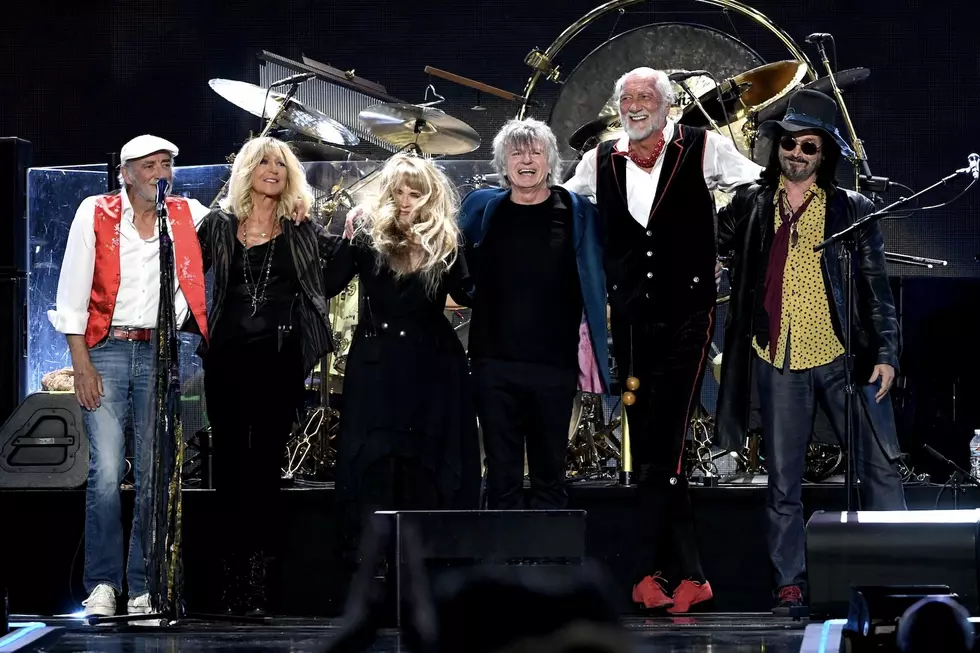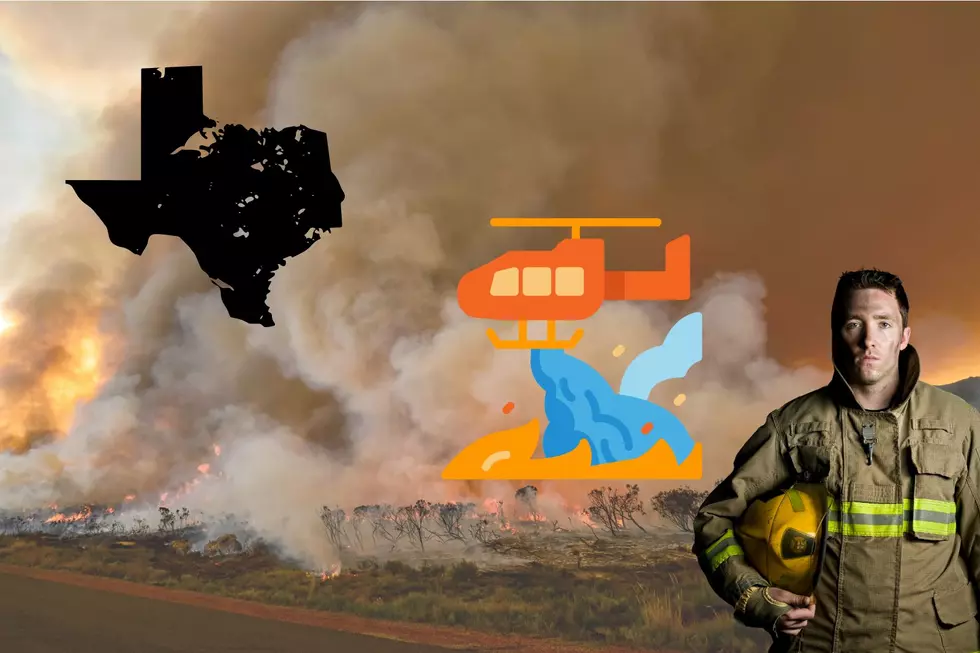
The Moment Ace Frehley Knew It Was Time to Leave Kiss
Ace Frehley doesn't think about time. That's what he tells us early in our conversation about his new solo album 10,000 Volts as we point out that it's arriving 50 years after the debut album from his former band Kiss.
"I don't think about [that] and dates," he explains. "I've been sober for 17 years and one of the things that they teach you in sobriety is to live in the now." But hearing him talk about his career, there were plenty of moments where things were clear. As Kiss became more successful, his own personal profile grew too. He became more confident in his own abilities. Once he had a hit with "New York Groove" from 1978's Ace Frehley solo outing, he saw that there could be a future that didn't involve Kiss. So eventually, he left.
More than 45 years later, Frehley has filed plenty of additional chapters. Starting with 2009's Anomaly, the guitarist has been on a creative tear, releasing a string of well-received solo albums -- including two collections of covers under the Origins banner, with a third in the planning stages.
"I get a chance to re-record songs that influenced me when I was maturing as a guitarist,' he shares. "But I also get to invite people to perform on those records with me. So there's a couple of reasons that I enjoy doing those records."
But he's extremely proud of 10,000 Volts, which has had both fans and fellow guitar players buzzing since he released the title track as the initial single. Longtime Trixter guitarist Steve Brown was an important catalyst in the project, helping to produce and co-write the bulk of the material for the record. "He had a lot of faith in me," Frehley tells UCR. "Sometimes I don’t always have as much faith in me as other people do. I don’t know why."
During the conversation below, Frehley digs into 10,000 Volts, the origins of his guitar sound and some memorable moments from his history with Kiss.
As 10,000 Volts is coming out, it's now been 50 years since your first album with Kiss. What do you think young Ace would think about where you are now?
It’s been 50 years? [Laughs] I don't dwell on the past and the future is never set, so you’ve got to take things one day at a time. I mean, all of these people around me go, “Oh, this is the date when Destroyer was released.” You know, it doesn’t mean anything to me. I think we had a great run. I toured with the band the first time as one of the co-founders and I rejoined the group for the reunion tour. That wasn't that great, because I wasn’t an equal member. Towards the end of that, things got weird. I decided to leave for a second time and now I’ve been having a blast doing my own thing.
What came out of all of that is that you have this legacy that's inspired a lot of guitar players. With Steve Brown on this new album, it seems like it's all coming full circle.
Well, I mean, Steve told me from day one, he said that me and Eddie Van Halen are the two people that made him pick up the guitar. He knows probably every one of my guitar solos. It’s such a joy to work with Steve, because he’s a fan on top of it. There’s a lot of respect there. I have a lot of respect for him as well. Because he’s a great songwriter and a great guitarist. He’s been engineering with Pro Tools for 30 years, so he’s a very good engineer. So the beauty of working with Steve is that we don’t have to have a third person in the studio to make sure everything is getting recorded properly. You know, he watches the meters, I just do my thing.
Watch Ace Frehley's 'Walkin on the Moon' Video
How did he push you as a guitar player?
There’s one song on the album that neither of us wrote. That’s “Life of a Stranger.” That song was over the [closing credits] for the movie The Transporter. I never forgot that song, even though it was done quite differently from the way I recorded it. It was performed by this woman, Nadia and it was recorded very Europop. You know, with just a drum machine, very sparse. I remember when we decided to record that. I played it for Steve and he fell in love with the song as well. He can hear a good song just like I can -- with a good melody and storyline, a great bridge. That song is one of the few songs I’ve ever worked on where the chorus modulates twice. I said to Steve, “I don’t know if I’m going to be able to sing this, with the modulation.” He goes, “Don’t worry about it, Ace. I’ll get you to sing it.” He just pushed me. I nailed it. Steve was like that.
READ MORE: Ace Frehley Albums Ranked
How difficult was it for you to land on your guitar tone originally?
You know, that’s one thing I still haven’t been able to figure out. [Laughs] My guitar sound is a Les Paul through a Marshall, pretty much turned up to 10. I only use the bridge pickup. In fact, on all of the Les Pauls I use live, the middle and the neck pickup are disconnected. It’s just like Eddie Van Halen, he only used the triple pickup. That’s my sound. And for me, it’s not hard to get. But the one thing that I do differently than a lot of guitar players, is the way I hold the pick. A lot of times, when I hit the string, I’ll be hitting the string and muffling it with my thumb. That way, I get harmonics. I can kind of control the tone a little, with just how I pluck the string. You know, Tommy Thayer can play my solos note for note, but it doesn’t sound the same.
The evolution of your career has been really interesting.
The first run I did with Kiss, God, after Alive hit and we started headlining all over the world, I felt like I was on a roller coaster and couldn’t get off. Because everybody wanted to book us. In 1977, we were voted as the world’s biggest band by the Gallup Poll. Paul [Stanley] and Gene [Simmons] are workaholics, so they constantly wanted to work. But I had a young daughter and I had a beautiful home in Wilton, Connecticut. I wanted to enjoy some of the fruits of my labor. I loved going fishing and hanging out with my friends. Those guys didn’t have any friends and they’ll be the first to admit it. Especially Gene. I mean, the main thing that Gene is interested in is women. [Laughs] I mean, more power to him. You do what blows up your skirt. I like to do a lot of things. I love to gamble. I love going to Vegas. I can’t drink and do drugs anymore, but I can have sex and gamble.
READ MORE: How Kiss Came 'Alive!' by Using Some Studio Magic
There was a hefty amount of criticism of the band, so things like the Gallup Poll probably were good validation of what you were doing.
I used to get frustrated when I’d read the paper the following day and read the review of our show. A lot of times, it talked about the pyrotechnics, the elaborate costumes and makeup. And a lot of times, it didn’t really talk much about the music. That used to bother me, because for me, it was always the music first and the show second.
That makes sense.
With the success of my solo album with “New York Groove,” having the only hit [from the Kiss solo albums] I kind of saw the writing on the wall. I realized I was more creative away from Paul, Gene and Peter [Criss] than when I was with them. I knew eventually that I was going to end up forming my own band and leaving the group. That’s what happened. I mean, I lost millions of dollars by doing that. But what I gained was sanity. [Laughs] To me, that’s more important. I mean, if you don’t have your health and sanity, it doesn’t matter if you have a hundred million dollars in the bank. You’ve got to be happy. I’ve met so many rich people that are really unhappy people.
Listen to Kiss' 'Cold Gin'
How meaningful was it for you to have "Cold Gin," a song that you wrote, on the debut album?
That was great, you know. But the first couple of records, I didn’t feel comfortable as a lead singer. So I’d either have Gene or Peter sing the songs that I wrote. I was singing backgrounds on a lot of the songs live and eventually, the guys said, “Ace, you can sing. Why don’t you write a song and sing it?” So I wrote “Shock Me.” The first time I sang that live was at Madison Square Garden. It was a little nerve-wracking, because I didn’t know how it was going to come out -- or whether my voice would hold up. But it did and it’s become a favorite. Once I got “Shock Me” under my belt, I started writing more songs. I wanted to sing my own songs at that point. Of course, with the success of the ‘78 solo record when we all went our own way, I just realized eventually that it was time to move on. I wanted to be my own boss and not have people tell me what to do. That was the icing on the cake, the success of the solo record.
READ MORE: Top 10 Ace Frehley Kiss Songs
With hindsight, "Cold Gin" shows that you had a knack for writing a good hook right from the start.
Believe it or not, I wrote that hook -- the guitar riff -- I wrote it in my head while I was riding on the subway to go down to rehearsal. When I got to rehearsal, I grabbed my guitar, turned on the amp and started playing the riff. All of the guys loved it. They said, “You know, that could be a great song.” I’m also the kind of person who likes to give credit where credit is due. We ended up recording that song and I wrote the lyrics, but Gene wrote the breakdown section. [Frehley imitates the melody] He wrote that whole part, but he wouldn’t take credit for it. He said, “Ace, this is your song.” But he was the one that wrote that section. I did all of the soloing -- and he sang it, but I’m singing it now live [with my solo band]. It’s a fun song to sing. It’s not too hard to sing.
How important was the first tour when it came to your further development as a player?
The first tour we did together, we did a Canadian tour in the wintertime. [Laughs] Nobody [as far as other bands] wanted to do it and our agent got us on the tour. [Doing those concerts] was a real treat, because we got a chance to play in Canada and develop our stage show. We only had to play 50 or 60 minutes. We didn’t have to do an hour and a half show like when you’re a headliner. It gave us a lot of good experience, learning how to be on the road and dealing with the ups and downs of touring.
Watch Ace Frehley's 'Cherry Medicine' Video
Ace Frehley Albums Ranked Worst to Best
Gallery Credit: Matthew Wilkening






